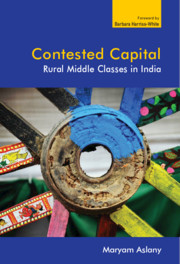Book contents
- Frontmatter
- Dedication
- Contents
- List of Figures and Maps
- List of Tables
- List of Abbreviations
- Foreword
- Acknowledgments
- Introduction: The Problem of the ‘Rural Middle Class(es)’
- 1 Trajectory of the Indian Middle Class: Its Size and Geographical Variations
- 2 In Search of the Rural Middle Classes: From Village Stratification to Rural Household Variations
- 3 Marx: Capital, Labour and the Rural Middle Classes
- 4 Weber: Marketable Capital, Status and the Rural Middle Classes
- 5 Bourdieu: Cultural Capital, Self-perception and the Middle-class Identity in Rural India
- Conclusion: Understanding the Rural Middle Classes
- Appendix A1 Non-farm Occupations in Rahatwade and Nandur
- Appendix A2 Caste and Occupations: The Urban Middle-Class Labour Market
- Appendix A3 Caste and Occupations in Rural India since 1991
- Appendix A4 Caste and Income Distribution
- Appendix A5 Caste and Socio-economic Indicators in Rural and Urban India
- Appendix A6 Caste Composition of Urban Middle Classes in India
- Appendix A7 Caste Composition of the Rural Middle Classes in Maharashtra
- Appendix A8 Household Survey Questionnaire 1
- Appendix A9 Household Socio-economic Survey Questionnaire 2
- References
- Index
Conclusion: Understanding the Rural Middle Classes
Published online by Cambridge University Press: 13 May 2020
- Frontmatter
- Dedication
- Contents
- List of Figures and Maps
- List of Tables
- List of Abbreviations
- Foreword
- Acknowledgments
- Introduction: The Problem of the ‘Rural Middle Class(es)’
- 1 Trajectory of the Indian Middle Class: Its Size and Geographical Variations
- 2 In Search of the Rural Middle Classes: From Village Stratification to Rural Household Variations
- 3 Marx: Capital, Labour and the Rural Middle Classes
- 4 Weber: Marketable Capital, Status and the Rural Middle Classes
- 5 Bourdieu: Cultural Capital, Self-perception and the Middle-class Identity in Rural India
- Conclusion: Understanding the Rural Middle Classes
- Appendix A1 Non-farm Occupations in Rahatwade and Nandur
- Appendix A2 Caste and Occupations: The Urban Middle-Class Labour Market
- Appendix A3 Caste and Occupations in Rural India since 1991
- Appendix A4 Caste and Income Distribution
- Appendix A5 Caste and Socio-economic Indicators in Rural and Urban India
- Appendix A6 Caste Composition of Urban Middle Classes in India
- Appendix A7 Caste Composition of the Rural Middle Classes in Maharashtra
- Appendix A8 Household Survey Questionnaire 1
- Appendix A9 Household Socio-economic Survey Questionnaire 2
- References
- Index
Summary
The ‘middle class’ has become one of the key categories of economic analysis and developmental forecasting for all observers of India – whether from government, academia, policymaking, business or media. All this discussion suffers, however, from one major oversight: it assumes that the middle class is a uniquely urban category. Studies dedicated to understanding the middle class, in India and globally, almost entirely overlook its rural presence. As this book has demonstrated, however, more than a third of India's middle class is rural, and 17 per cent of rural households belong to the middle class. My purpose has been to bring this vast and dynamic population into view, and to fully confront the neglected questions surrounding India's rural middle class.
However, probing the development of the rural middle class required an exploration of the ways in which the middle class is defined theoretically, and the application of theoretical insights to generate empirical understandings. Given that there is no single overarching theory, critical pluralism came to be the order of the day. Three analytical lenses have helped me examine in considerable detail the making of the Indian rural middle classes – those of Marx, Weber and Bourdieu. This plural approach elucidates the dynamics of middle class formation in the wake of the introduction of economic liberalisation, and contributes to a holistic understanding of the economic characteristics, social composition, cultural practices, aspirations, everyday worlds and social identifications of the rural middle classes.
While urban India is being liberalised, rural liberalisation has been an uneven process in both economic and social terms. For some decades, agriculture has no longer been the primary focus of life in rural India. Diversification is now a central feature of rural economy and society, as households have undergone social and economic transformations, and in so doing have developed a new sense of class identity and aspirations. In the villages I have studied, and probably in many other parts of rural India, industrialisation has produced new social relations of production, accumulation strategies and labour relations. For the rural youths it has facilitated entry into the skilled labour market, a process they have accelerated with intensive pursuit of education and training, fast-tracked through the informal economy of technical credentials. The resulting rural middle class has created distinctive lifestyles, aspirations and consumption patterns. In what follows I will condense the findings of this book.
- Type
- Chapter
- Information
- Contested CapitalRural Middle Classes in India, pp. 203 - 210Publisher: Cambridge University PressPrint publication year: 2020



